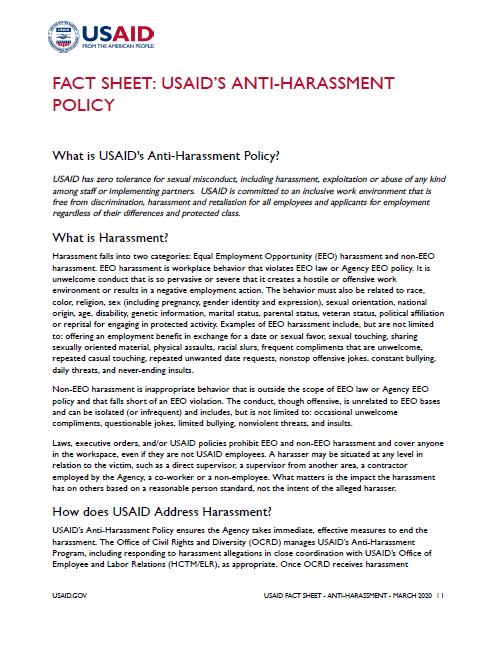- Work With USAID
- How to Work with USAID
- Organizations That Work With USAID
- Find a Funding Opportunity
- Resources for Partners
- Preventing Sexual Misconduct
- USAID Partners
- Acquisition & Assistance Ombudsman
- Acquisition & Assistance Policy Directives
- Development Information Solution (DIS)
- Indirect Cost Rate Guide for Non-Profit Organizations
- Procurement Executive Bulletins (PEBs)
- Progress Report - Fiscal Report 2019
- Implementing Partner Notices Portals
- Partner Vetting System
- Branding
- COVID-19 Guidance For Implementing Partners
- Preparing for a World Altered by COVID-19
- Section 889 Partner Information
- Careers
- Get Involved
Speeches Shim
What is USAID’s Anti-Harassment Policy?
USAID has zero tolerance for sexual misconduct, including harassment, exploitation or abuse of any kind among staff or implementing partners. USAID is committed to an inclusive work environment that is free from discrimination, harassment and retaliation for all employees and applicants for employment regardless of their differences and protected class.
What is Harassment?
Harassment falls into two categories: Equal Employment Opportunity (EEO) harassment and non-EEO harassment. EEO harassment is workplace behavior that violates EEO law or Agency EEO policy. It is unwelcome conduct that is so pervasive or severe that it creates a hostile or offensive work environment or results in a negative employment action. The behavior must also be related to race, color, religion, sex (including pregnancy, gender identity, sexual orientation, or transgender status), national origin, age, disability, genetic information, marital status, veteran status, status as a parent, political affiliation or reprisal for engaging in protected activity. Examples of EEO harassment include, but are not limited to: offering an employment benefit in exchange for a date or sexual favor, sexual touching, sharing sexually oriented material, physical assaults, racial slurs, frequent compliments that are unwelcome, repeated casual touching, repeated unwanted date requests, nonstop offensive jokes, constant bullying, daily threats, and never-ending insults.
Non-EEO harassment is inappropriate behavior that is outside the scope of EEO law or Agency EEO policy and that falls short of an EEO violation. The conduct, though offensive, is unrelated to EEO bases and can be isolated (or infrequent) and includes, but is not limited to: occasional unwelcome compliments, questionable jokes, limited bullying, nonviolent threats, and insults.
Laws, executive orders, and/or USAID policies prohibit EEO and non-EEO harassment and cover anyone in the workspace, even if they are not USAID employees. A harasser may be situated at any level in relation to the victim, such as a direct supervisor, a supervisor from another area, a contractor employed by the Agency, a co-worker or a non-employee. What matters is the impact the harassment has on others based on a reasonable person standard, not the intent of the alleged harasser.
How does USAID Address Harassment?
USAID’s Anti-Harassment Policy ensures the Agency takes immediate, effective measures to end the harassment. The Office of Civil Rights and Diversity (OCRD) manages USAID’s Anti-Harassment Program, including responding to harassment allegations in close coordination with USAID’s Office of Employee and Labor Relations (HCTM/ELR), as appropriate. Once OCRD receives harassment allegations, the Anti-Harassment Program team reviews the allegations, collects the necessary statements from the parties involved, makes the appropriate determination, and refers the determination to the appropriate office and management officials. OCRD may conduct formal investigations into allegations of harassment that are complex and require additional information beyond the initial statements received. These investigations may extend to after-hour functions or activities that do not occur within the walls of an office, whether at the Agency’s headquarters in Washington, D.C., or an overseas mission. Supervisors and managers may take immediate action concerning reports of employee misconduct, as necessary to maintain the safety of employees and the efficiency of operations.
If a violation of EEO law or Agency policy has occurred, OCRD will coordinate with the appropriate entity to determine a course of action -- whether HCTM/ELR for U.S. direct hires or the Office of Acquisition and Assistance (M/OAA) and/or responsible Contracting Officer for contractors. The range of appropriate actions is case-dependent, but can include coaching/counseling, training or disciplinary action — up to and including removal for cause. Employees may also be disciplined for inappropriate conduct in the workplace, even if it does not meet the definition of illegal harassment.
USAID has a responsibility to comply with legal requirements to take prompt and appropriate action to both eliminate harassment and prevent it before it becomes severe or pervasive. Governing policies include: Anti-Sexual Harassment Policy 3 FAM 1525, Discriminatory Harassment Policy 3 FAM 1526, and Policy on Consensual Relationships 3 FAM 1527.
How to Report Harassment
All allegations of harassment at USAID, including sexual harassment, can be reported through the Misconduct Reporting Portal on LaunchPad. USAID staff can also report harassment through the Service Central Helpdesk at (202) 712-1234, or by contacting OCRD at ocrdharassment@usaid.gov or by telephone at 202-712-1110. You may also report harassment to anyone in your supervisory chain. Supervisors and management officials (e.g., Administrative Management Officers, Executive Officers, and Regional Legal Officers) must report prohibited harassment within 24 hours of becoming aware of the allegation. Confidentiality will be maintained throughout the process to the extent consistent with adequate investigation and appropriate corrective action, but cannot be guaranteed. The goal is to provide the Agency with the information necessary, as soon as possible, to stop any harassing behavior.
Reporting harassment does NOT preclude an individual’s right to engage the EEO complaint process and participate in EEO counseling. Contact OCRD for more information regarding EEO laws and Agency EEO policy or to report discrimination.


Comment
Make a general inquiry or suggest an improvement.